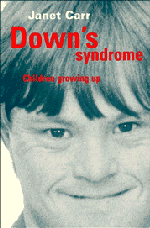Book contents
- Frontmatter
- Contents
- Acknowledgements
- 1 Down's syndrome – implications of the diagnosis
- 2 Populations and procedures
- 3 The developmental study
- 4 Self-care and independence
- 5 Behaviour and discipline
- 6 Focusing on the individual
- 7 Effect on the families
- 8 Help from services
- 9 Summary and conclusions
- References
- Index
3 - The developmental study
Published online by Cambridge University Press: 06 July 2010
- Frontmatter
- Contents
- Acknowledgements
- 1 Down's syndrome – implications of the diagnosis
- 2 Populations and procedures
- 3 The developmental study
- 4 Self-care and independence
- 5 Behaviour and discipline
- 6 Focusing on the individual
- 7 Effect on the families
- 8 Help from services
- 9 Summary and conclusions
- References
- Index
Summary
In 1963, at the start of the Surrey study, the task for the psychologist was simply to give developmental tests to the identified cohort of infants with Down's syndrome. Subsequently, the scope of this part of the inquiry was considerably broadened, but the mapping of the intellectual progress of the group has continued to be an important aspect of it. The focus of the intellectual mapping has also broadened: from 6 weeks to 4 years, tests of mental and motor development only were given; at 11 years a test of language was added, and at 21 years tests of academic attainment (reading and arithmetic) were also included. In this chapter the data from the 11 and 21 year studies of intellectual ability (IQ) will be presented, followed by the data on intellectual achievement (language, reading and arithmetic).
Intellectual ability
Results up to 4 years of age, already reported (Carr 1970, 1975), showed that: at 6 weeks old the mean Bayley DIQ of the children with Down's syndrome was significantly below that of the controls; ratio IQs of the children with Down's syndrome declined with increasing age, from a mean of 80 at 6 months to a mean of 45 at 4 years; there was no significant effect of social class, in contrast with the controls; mean scores for girls were significantly higher than those for boys, while those for the home-reared children were significantly above those for the non-home-reared (see Fig. 3.1).
- Type
- Chapter
- Information
- Down's SyndromeChildren Growing Up, pp. 23 - 43Publisher: Cambridge University PressPrint publication year: 1995
- 1
- Cited by



